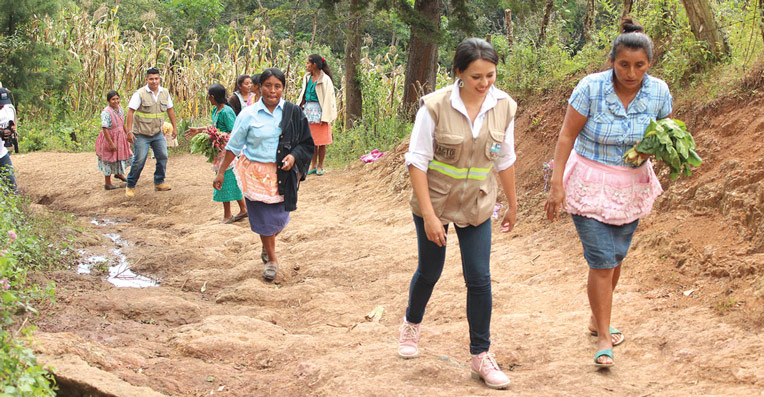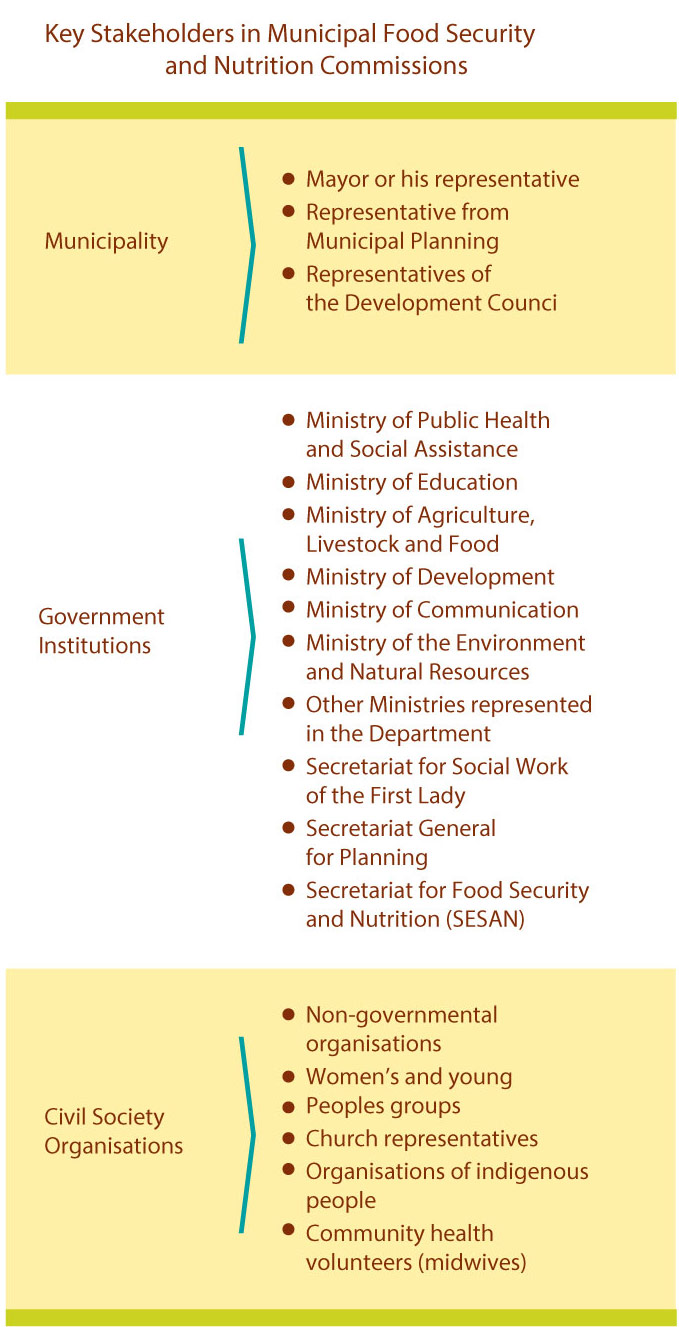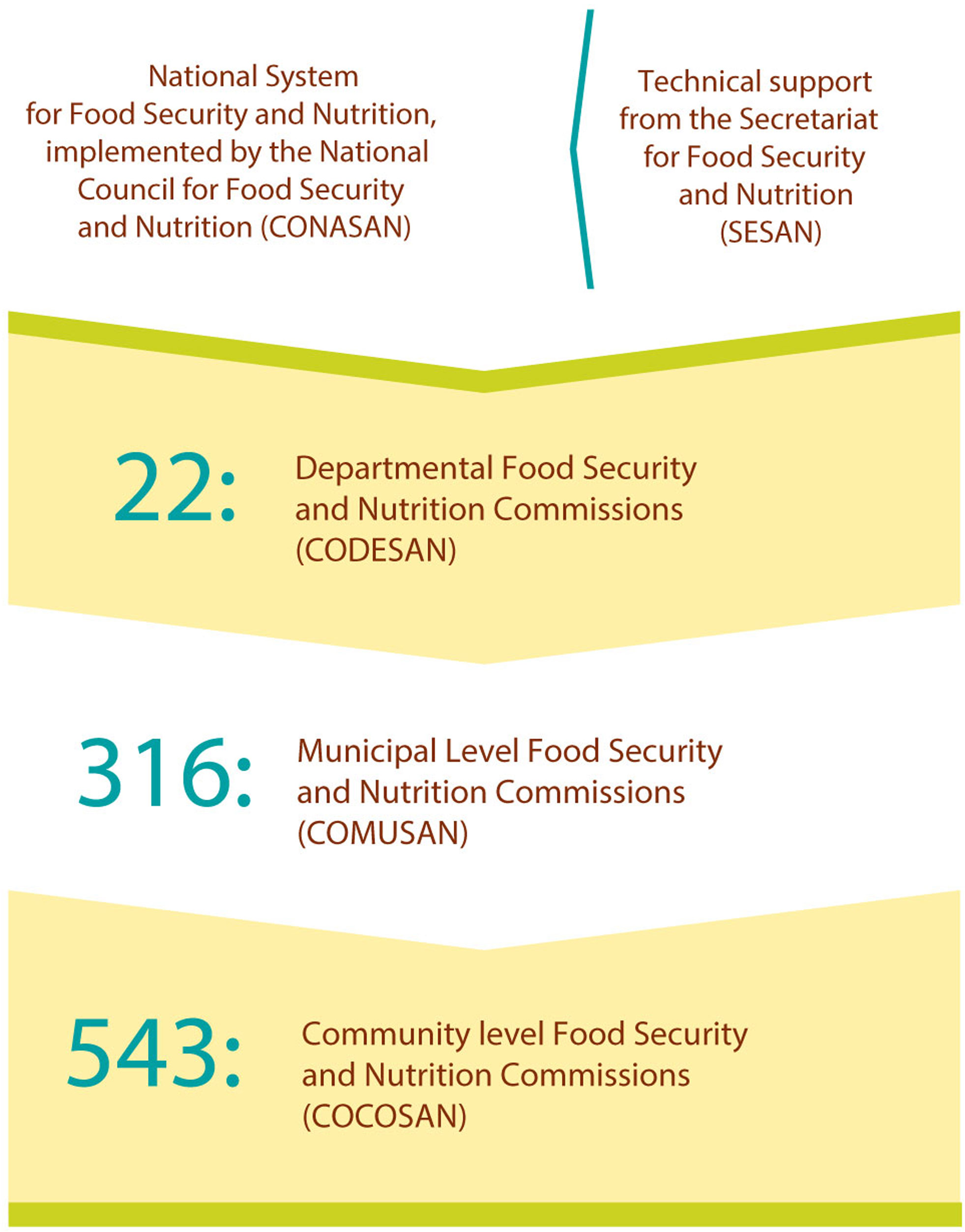Extending Out to Communities
When the President of Guatemala, Otto Pérez Molina, learned that less than 1% of Guatemala’s population believed their country had a problem with malnutrition, he instructed his entire cabinet to live in rural areas for a week with a family facing chronic food shortages and malnutrition. The result was the launch of the whole-of-government ‘Zero Hunger Pact’ in 2012 together with a mobilization campaign known as ‘The 1,000 Days Window’.
[vc_row row_type=”row” text_align=”left” css_animation=””][vc_column width=”1/2″]

Guatemala has established an ambitious system of de-centralised Food Security and Nutrition Commissions that bring together different groups and sectors.
Iván Mendoza, ex-Advisor at the Secretariat of Food Security and Nutrition (SESAN), Government of Guatemala describes the system…
[/vc_column_text][/vc_column][/vc_row][vc_row row_type=”row” text_align=”left” css_animation=””][vc_column][vc_separator type=”transparent”][/vc_column][/vc_row][vc_row row_type=”row” text_align=”left” css_animation=””][vc_column]
[vc_column_text custom_options=””]“An intergenerational change can only take place with the collective commitment to one common goal: the eradication of malnutrition. Interagency coordination is a prerequisite for this change”
Luis Enrique Monterroso,
Secretary of SESAN
[/vc_column_text][/vc_column][/vc_row][vc_row row_type=”row” text_align=”left” css_animation=””][vc_column][vc_separator type=”transparent”][/vc_column][/vc_row][vc_row row_type=”row” text_align=”left” css_animation=””][vc_column][vc_column_text custom_options=””]When the President of Guatemala, Otto Pérez Molina, learned that less than 1% of Guatemala’s population believed their country had a problem with malnutrition, he instructed his entire cabinet to live in rural areas for a week with a family facing chronic food shortages and malnutrition. The result was the launch of the whole-of-government ‘Zero Hunger Pact’ in 2012 together with a mobilization campaign known as ‘The 1,000 Days Window’. [/vc_column_text][/vc_column][/vc_row][vc_row row_type=”row” text_align=”left” css_animation=””][vc_column][vc_separator type=”transparent”][/vc_column][/vc_row][vc_row row_type=”row” text_align=”left” css_animation=””][vc_column][vc_column_text custom_options=””]The ‘Zero Hunger Pact’ enshrines a bold, multi-sectoral plan to reduce stunting by 10% in children by 2015. The
plan includes specific nutrition interventions such as the promotion of exclusive breastfeeding, increase in access to fortified food, and to health and nutrition services as well as programmes that address the underlying causes of malnutrition such as the creation of income generation opportunities, improved water and sanitation facilities and better education for women.
The ‘Zero Hunger Pact’ is the official government instrument for implementing Guatemala’s Food Security and Nutrition Policy. Established in 2005, the policy sets out the thematic areas, principles, strategies and programmes to tackle food and nutrition insecurity in a holistic and coordinated manner. A year later, a law
was passed to institutionalize a National System for Food Security and Nutrition. Article 34 of the law lays
down the basis for de-centralization of the system at departmental, municipal and community levels. It states
that urban and rural Development Councils will set up Food Security and Nutrition Commissions to implement the strategic policy through related programmes, projects and activities.
The national system is implemented by the National Council for Food Security and Nutrition (CONASAN) with technical support from the Secretariat for Food Security and Nutrition (SESAN). CONASAN meets every three months and is chaired by the Vice-President of Guatemala. It has broad inter-ministerial and multisectoral
participation from nine ministries, five other government bodies, representatives from the private sector and civil society. [/vc_column_text][/vc_column][/vc_row][vc_row row_type=”row” text_align=”left” css_animation=””][vc_column][vc_separator type=”transparent”][/vc_column][/vc_row][vc_row row_type=”row” text_align=”left” css_animation=””][vc_column][vc_column_text custom_options=””]
De-centralizing multi-stakeholder platforms
The introduction of the ‘Zero Hunger Pact’ included provision for decentralized Food Security and Nutrition Commissions at the departmental, municipal, and community levels. As new dynamic multi-sectoral and multi-stakeholder platforms for nutrition. They have become the platforms for coordination and roll out of the ‘Zero Hunger Pact’.
In 2006, an extensive advocacy campaign was launched. At departmental level, SESAN delegates presented an analysis of the nutrition and food security situation and highlighted the need for joint efforts to address
the problems at Departmental Development Council meetings.
By the end of 2008, each of the 22 departments in Guatemala had legally formed a Departmental Food Security and Nutrition Commission (CODESAN). Departmental governors currently exercise leadership in CODESAN meetings that are attended by directors of sectoral institutions and civil society organization representatives.
CODESAN is responsible for leading the planning, implementation and monitoring of actions taking place at departmental level and ensuring that progress on meeting the goals related to the ‘Zero Hunger Pact’ arereported by implementing institutions. In addition, it acts as a platform for harmonising information systems and training processes. [/vc_column_text][/vc_column][/vc_row][vc_row row_type=”row” text_align=”left” css_animation=””][vc_column][vc_column_text custom_options=””]Similar advocacy efforts were undertaken at the municipal level. Municipal SESAN monitors, with the support of the departmental delegate, raised awareness and advocated for nutrition with mayors, Municipal Development Councils and organizations working in the municipality.
In 2011, five years after endorsement of the Food Security and Nutrition Policy, 316 out of 334 municipalities have formed official Municipal Food Security and Nutrition Commissions (COMUSAN). Around 80-90% of these commissions are fully operational in that they meet regularly and discuss food security and nutrition issues from the different perspectives of members of the commission. Effective multi-sectoral coordination, under municipal leadership, remains a challenge, however, and requires strengthening. In addition, it is a priority to ensure that the Municipal Development Councils prioritize, incorporate and allocate funding for food security and nutrition in Municipal Development Plans. It can be challenging to ensure that all government institutions represented in COMUSAN provide appropriate services of good quality and in a timely manner.
At community level, the formation of Food Security and Nutrition Commissions (COCOSAN) came later, and
was initially focused in those communities where acute malnutrition affected the population most intensely.
There are currently 543 COCOSAN organized and operating. A challenge for the country is to continue to form COCOSAN in more communities. [/vc_column_text][/vc_column][/vc_row][vc_row row_type=”row” text_align=”left” css_animation=””][vc_column][vc_separator type=”transparent”][/vc_column][/vc_row][vc_row row_type=”row” text_align=”left” css_animation=””][vc_column]
Support from United Nations agencies
The United Nations Children’s Fund (UNICEF), within the same joint UN framework of cooperation, and with the aim of improving dietary practices and child care, has incorporated a communication’s strategy for development, linked to the COMUSAN.
The process began with the organization of a Diploma in Communication for Development for municipal health and education delegates, and for representatives of SESAN, which combined the development of theoretical content with the implementation of interventions at the community level.
As a result of the training process, a ‘Sub-Committee on Communications’, linked to the COMUSAN, was established. This committee, based on local analyses, develops and implements a participatory communication plan that promotes participation and empowerment by local stakeholders.
The process began in the Department of Totonicapán with six municipalities and to date has been extended to 55 municipalities in the country
Functions of multi-stakeholder platforms
The functions of the Food Security and Nutrition Commissions are wide-ranging from sensitization about malnutrition and food insecurity to institutional strengthening, coordination to support implementation, monitoring and surveillance systems. The specific functions are to:
- coordinate development of food security and nutrition operational plans to meet the needs of the vulnerable population with the participation of governmental and other stakeholder groups present at field level
- prioritize support for diagnostic studies and assessments of food security and nutrition vulnerability at field level
- develop coordinated operational planning
- manage, design and develop food security and nutrition-related programmes and projects with government budgets.
- establish food security and nutrition surveillance and early warning methods (this includes establishing sentinel sites for timely identification of at-risk situations or food crisis, forecasting and responding to food security and nutrition emergencies as set out in the strategy and protocols for addressing seasonal hunger and providing humanitarian aid)
- coordinate food assistance to families affected by natural disasters and at risk of food insecurity and malnutrition.
[/vc_column_text][/vc_column][vc_column width=”1/2″][vc_column_text custom_options=””]
De-centralized multi-stakeholder platforms
[/vc_column_text][/vc_column][/vc_row][vc_row row_type=”row” text_align=”left” css_animation=””][vc_column][vc_separator type=”transparent”][/vc_column][/vc_row][vc_row row_type=”row” text_align=”left” css_animation=””][vc_column][vc_column_text custom_options=””] [/vc_column_text][/vc_column][/vc_row][vc_row row_type=”row” text_align=”left” css_animation=””][vc_column][vc_separator type=”transparent”][/vc_column][/vc_row][vc_row row_type=”row” text_align=”left” css_animation=””][vc_column]
[/vc_column_text][/vc_column][/vc_row][vc_row row_type=”row” text_align=”left” css_animation=””][vc_column][vc_separator type=”transparent”][/vc_column][/vc_row][vc_row row_type=”row” text_align=”left” css_animation=””][vc_column]
Multi-sectoral and multi-stakeholder action in Escuintla
information management system supported by government, UN and civil society agencies and the successful follow up of cases of acute malnutrition done by different institutions, meant that of 1,637 cases of acute malnutrition, 686 cases (42%) were cured.
 [/vc_column_text][/vc_column][vc_column width=”1/2″][vc_column_text custom_options=””]
[/vc_column_text][/vc_column][vc_column width=”1/2″][vc_column_text custom_options=””]
Signs of success
Working together through multi-stakeholder and multi-sectoral platforms in the form of Food Security and Nutrition Commissions appears to be contributing positively to the aims of the ‘Zero Hunger Pact’. An example is the Department of Escuintla.
 [/vc_column_text][/vc_column][/vc_row][vc_row row_type=”row” text_align=”left” css_animation=””][vc_column][vc_separator type=”transparent”][/vc_column][/vc_row][vc_row row_type=”row” text_align=”left” css_animation=””][vc_column]
[/vc_column_text][/vc_column][/vc_row][vc_row row_type=”row” text_align=”left” css_animation=””][vc_column][vc_separator type=”transparent”][/vc_column][/vc_row][vc_row row_type=”row” text_align=”left” css_animation=””][vc_column]
Key Lessons
- The experience of setting up de-centralized MSPs for nutrition at departmental, municipal and community levels has positioned the issue of food and nutrition security at each point of the decision making process.
- When there are clear objectives and thematic actions agreed between government institutions and other stakeholders, there is greater commitment to accompany and support planning, implementation, monitoring and evaluation.
- Ensuring that MSPs are enshrined within the Guatemalan legal framework has meant that they are institutionalised and establish processes which have greater consistency and sustainability.
- When local government and communities are actively involved in MSPs, it leads to greater participation in planning. This involvement means that actions are more easily monitored and sustained.
